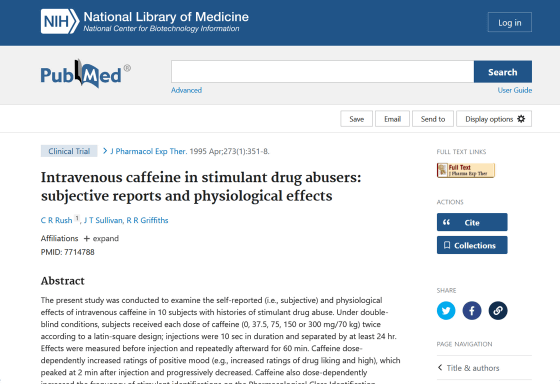What happens when you inject caffeine intravenously?

Intravenous caffeine in stimulant drug abusers: subjective reports and physiological effects - PubMed
https://pubmed.ncbi.nlm.nih.gov/7714788/

Intravenous Caffeine - by Jeff Clark, MD
https://www.sexdrugsandsuicide.com/p/intravenous-caffeine
Not only caffeine but also drugs such as alcohol, nicotine, cocaine, heroin, etc. have common dosage methods, and in the case of caffeine, oral intake with drinks and tablets is basic. As a result, Mr. Clark said that he was very surprised to hear from a patient that he had taken caffeine intravenously.
However, this patient does not usually inject caffeine intravenously, but seems to have received an intravenous injection of caffeine as part of the surgical procedure performed under general anesthesia. However, normally the patient should be completely unconscious when the caffeine injection is done, but this patient was injected with caffeine before he fell asleep completely. As a result, he said that he was suffering from intense anxiety that could be said to be 'one of the worst experiences in life.'

Anxiety and hyperesthesia are known symptoms of
Admittedly, there are many downsides to injecting caffeine intravenously. Injecting the drug causes pain from the needle, the risk of infection, and is overwhelmingly more troublesome than ingesting energy drinks or coffee, and caffeine is quickly absorbed in the intestine, so intravenous injection There is not much benefit to injecting with .
Therefore, Mr. Clark investigated whether there were any experimental results that investigated the ``effect of caffeine intravenous injection'' in the past. As a result, a study published in 1995 by a research team at Johns Hopkins University in the United States was a hit.
The research team recruited 10 subjects with a history of cocaine use under the pretext of 'investigating the effects of various drugs on people's moods.' Subjects were given a list of anti-anxiety drugs Xanax (alprazolam) , stimulants, cocaine, etc. as a ``list of drugs that may be intravenously injected in experiments'', but in fact caffeine Only intravenous injections were given.
Subjects stayed at the research facility for 20 days, kept oral caffeine at zero for several days, and received intravenous caffeine injections. The research team conducted a questionnaire to the subjects after intravenously injecting various doses of caffeine up to 37.5 mg, which is slightly more than 0 mg of caffeine, 37.5 mg, and 300 mg, which is equivalent to 4 to 5 cups of espresso. In the questionnaire, 'Are you high?', 'Did you feel any positive effect?', 'Did you feel any bad effect?', 'Do you like the drug you took this time?', 'I want to take cocaine' What do you think?' was asked.

Analysis of the questionnaire results confirmed that overall high doses of caffeine were associated with positive effects and euphoria. Also, although there was no clear negative effect with low doses of caffeine, most subjects felt abnormal odors such as `` rubber burning smell '', `` musty odor '', and `` ammonia odor '' at high doses. , one subject reported feeling a 'bitter taste'. In addition, subjects who took the highest dose said that the desire to `` want to take cocaine '' increased slightly.
Clark said the study showed that intravenous caffeine had positive effects when given in the correct dose, and it's interesting that the US National Institute of Drugs funded such research. said.
However, overdose of caffeine can cause symptoms such as dyspnea, nausea, anxiety, blood pressure drop, hyperventilation, and in the worst case, death . Therefore, it is safer to take only the appropriate amount of caffeine by oral intake from beverages and avoid intravenous injection.
What happens when you overdose on caffeine? -GIGAZINE

Related Posts:
in Science, Posted by log1h_ik






